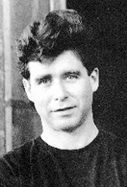Live on Arrival
Jay
By David Templeton
As the end credits for Charlie Sheen's eerie new conspiracy-flick, The Arrival, roll across the screen, a short, trench-coated fellow, having recognized my guest as a famous author--though unable to recall his name--is now trailing him up the aisle, pummeling him with questions, speaking in hushed, clandestine tones as if he and McInerney were members of some secret underground cabal.
"You know the actor who played that guy who was talking to that guy?" he mutters, glancing about suspiciously, lowering his voice. "Didn't he look kind of familiar?" The question hangs there like a tiny UFO, defying any logical response. We exit the theater.
He follows, chatting away, until we finally lose him by ducking into a diner a few blocks up the street.
"Man, is he gone yet?" McInerney laughs, peering out the window as he slips into a corner booth. "That was really weird."
We are in San Francisco, where the New York�based author is spending a few days to promote his new novel, The Last of the Savages (Knopf, 1996). A strong, ambitious work, McInerney's latest is sure to test those readers who know him for Bright Lights, Big City, the novel that established his career. Though Savages explores some of the same class-struggle issues as all of his work, this finely crafted tale of two friends who meet amid the social upheaval of the '60s and take divergent paths through the next four decades, is funnier, sadder, and wiser by far than anything he has produced to date.
"I do watch the X-Files," McInerney confesses, alluding to the subject of alien invasions explored in The Arrival.
"I like the general atmosphere of paranoia. It's not so much that I believe in the paranormal, but the whole idea--and it's actually a kind of '60s idea--that you can't trust the authorities, that there is a sort of authoritarian conspiracy from the top of the government on down. Something that was borne out, in a way, by Watergate.
"That's exactly what my book is about," he says, surprising himself by finding a connection between his novel and the movie. "The book is about the question of what happened to that alleged revolution of the '60s. That's when the seeds of distrust were sown. That was when paranoia began to be hip--not only becoming fashionable, but becoming general."
But wasn't the paranoia of the '60s preceded by the Red Scare of the '50s, with all of the McCarthyist, anti-communist witch hunts?
"That was very different," he replies. "That was a sort of an external threat, the fear of being infected by something from outside. But in the '60s, the idea was not that the Communists were evil; it was our own people.
"I think that since then--particularly after Vietnam--the concept of distrusting the government, distrusting authority at all levels, has sort of spread out to the general population. It used to be sort of an elitist, countercultural idea, you know? Now it's been taken over by the right wing. The most popular conspiracy theory is this one-world government led by the United Nations that's supposedly about to take over. This is propounded by the extreme conservatives. They've co-opted the paranoia, and the anti-establishment language even, of the left in the '60s.
"This is fun!" McInerney exclaims suddenly, immediately launching into a spirited exploration of how The Arrival would have been different had it been filmed in the '50s.
"In the alien movies of the '50s," he suggests, "obviously, the aliens were all metaphorical communists."
Ah yes, the invasion from without. But by the mid-'70s, such peacemaking films as Close Encounters of the Third Kind were redefining the metaphor, going up against the remake of Invasion of the Body Snatchers and Alien. By the time E.T. flew in on his bicycle, Americans were ready to accept that communists and extraterrestrials alike were merely harmless, misunderstood fuzzballs. Now, at the end of the '90s, X-Files reigns, and a whole spate of films about the good old alien invasions, from without and from within (Independence Day, Mars Invades, Men in Black), are about to be released.
Does McInerny think that cultural paranoia is a cyclical event?
"It might be a millennial event," he responds. "There is all kinds of apocalyptic thinking that traditionally is associated with end of a century, and in this current case, the end of a millennium. It's a big, scary birthday. There is a lot to be scared of.
"Last of the Savages, actually, was born out of my sense that we're still playing out those battles of the '60s. The so-called Republican Revolution of '94 was kind of a battle to roll back the social and cultural advances of the last 30 years. Civil rights, social justice, artistic freedom: it's the same old battles all over again.
"There's a line in the book, 'I don't remember what the No. 1 song was that year, but paranoia was definitely the hit word.'
"That was true then, and you know what?" he shrugs, "It's still true."
[ Sonoma | MetroActive Central | Archives ] This page was designed and created by the Boulevards team.

McInerney
takes
an
alien
approach
Writer David Templeton takes interesting people to interesting movies in his ongoing quest for the ultimate post-film conversation. This time around, he connects up with the controversial brat-pack novelist Jay McInerney (Bright Lights, Big City) to see the new aliens-are-among-us science-fiction thriller, The Arrival. A strange little man has attached himself to McInerney.
From the June 20-26, 1996 issue of Metro Santa Cruz
Copyright © 1996 Metro Publishing and Virtual Valley, Inc.
